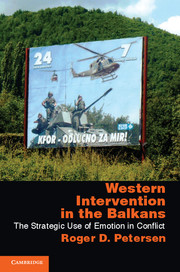Book contents
- Frontmatter
- Contents
- Acknowledgments
- Part 1 Background and Theory
- Part 2 Cases and Tests
- 7 Background to Western Intervention in the Balkans
- 8 The Case of the Roma in Kosovo
- 9 Background to Kosovo
- 10 Waiting for the West
- 11 Kosovo Intervention Games, I
- 12 Kosovo Intervention Games, II
- 13 Kosovo Conclusions
- 14 South Serbia
- 15 Macedonia
- 16 Bosnia
- 17 Montenegro
- 18 Conclusion
- Appendix A A Note on Names
- Appendix B Alternative Arguments
- References
- Index
- References
9 - Background to Kosovo
from Part 2 - Cases and Tests
Published online by Cambridge University Press: 05 June 2012
- Frontmatter
- Contents
- Acknowledgments
- Part 1 Background and Theory
- Part 2 Cases and Tests
- 7 Background to Western Intervention in the Balkans
- 8 The Case of the Roma in Kosovo
- 9 Background to Kosovo
- 10 Waiting for the West
- 11 Kosovo Intervention Games, I
- 12 Kosovo Intervention Games, II
- 13 Kosovo Conclusions
- 14 South Serbia
- 15 Macedonia
- 16 Bosnia
- 17 Montenegro
- 18 Conclusion
- Appendix A A Note on Names
- Appendix B Alternative Arguments
- References
- Index
- References
Summary
On Sunday, February 17, 2008, the Kosovo Parliament declared independence. Firecrackers exploded on the streets of Pristina and other Kosovar cities. The red and black Albanian flag, adorned with its two-headed eagle, was everywhere – draped on storefronts, waved on the streets, flying out of car windows. For almost every Kosovar Albanian, a dream held across generations had come true. Prime Minister Hasim Thaci, in his speech to Parliament, stated, “I feel the heartbeat of our ancestors.” For other Albanians who had suffered under Serbian oppression, it was less a dream come true and more an end to a nightmare. In the words of one Albanian who endured Serbian neighbors killing two of her relatives in 1999, “Independence is a catharsis. Things won't change overnight and we cannot forget the past, but maybe I will feel safe now and my nightmares will finally go away.”
Relations between Serbs and Albanians had never been good. The relationship embodies every negative experience studied in this book: high levels of mutual ethnic contempt, status reversals, and antagonistic historical schemas connected to periodic bouts of violence and ethnic cleansing. The last such violent episode occurred only a few years earlier (in 1999) and was marked by the Serbian killing of an estimated 10,000 Albanians and the ethnic cleansing of perhaps 800,000 more. Many in Kosovo mark the 1981 riots as the date of a fundamental shift in Kosovo. Since then, the battle over Kosovo's political status has always been high intensity. The Yugoslav government imprisoned thousands of Albanians in the early 1980s; the Milosevic regime purged tens of thousands in the late 1980s and early 1990s; Albanian leaders created a parallel society; the Kosovo Liberation Army conducted violent attacks that precipitated a civil war; NATO dropped tens of thousands of bombs; Albanians cleansed thousands of Serbs and launched a massive pogrom in 2004. For at least twenty-seven years, Kosovo was the site of a tumultuous and nearly never-ending struggle between Serbs and Albanians.
- Type
- Chapter
- Information
- Western Intervention in the BalkansThe Strategic Use of Emotion in Conflict, pp. 137 - 146Publisher: Cambridge University PressPrint publication year: 2011



